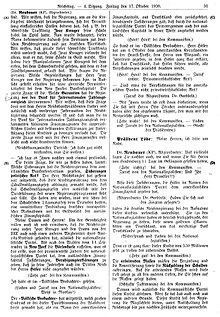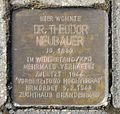Theodor Neubauer
Theodor Neubauer (born December 12, 1890 in Ermschwerd ; † February 5, 1945 in Brandenburg an der Havel ) was a German parliamentarian ( KPD ) and resistance fighter against National Socialism .
Life

The son of an estate inspector attended the humanistic grammar school in Erfurt from 1901 to 1910 and was raised patriotic and loyal to the emperor. From 1910 to 1913 he studied history and modern languages in Brussels , Jena and Berlin, and received his doctorate in 1913 on the social and economic conditions of the city of Erfurt before the Reformation . Politically, he was initially involved as a national liberal and volunteered for military service in 1914, became a lieutenant in 1915 and released after gas poisoning in 1917 . Then he was an assistant teacher at the Königin-Luise-Gymnasium in Erfurt.
In December 1918 he became a member of the German Democratic Party , but in late summer 1919 he joined the USPD . He published works in which he called for a real democratic popular education. In March 1920 he was the only teacher at his school to take part in the general strike against the Kapp Putsch , which resulted in his dismissal as a teacher.
He moved to Ruhla and joined the KPD with the left wing of the USPD at the end of 1920. As a teacher in Ruhla, he was elected to the Thuringian state parliament for the KPD in September 1921 . In October 1922 he became a teacher at the Realgymnasium Weimar .
On April 25, 1921, Theodor Neubauer carried out the first youth consecration in the Ruhla suburb of Kittelsthal with his friend and companion August Oberländer. He was later imprisoned with August Oberländer in Buchenwald concentration camp.
In October 1923, Neubauer was elected as a State Councilor in the SPD-KPD state government in Thuringia. He protested against the invasion of the Reichswehr , his immunity was lifted and he had to flee to the Rhineland at the end of October , where he became a full-time KPD functionary under the pseudonym Lorenz. In mid-1924 he was editor-in-chief of the Düsseldorf KPD newspaper Freiheit and became a member of the Reichstag in December 1924 (until 1933). In the factional struggles of 1925/1926, Neubauer initially sided with the ultra-left. From 1927 to 1929 he was again editor-in-chief of freedom . In 1930 he became an employee of the KPD Central Committee in Berlin, and in 1932 wrote a book about German foreign policy today and tomorrow . He also wrote numerous poems. From 1929 he lived with the photographer Lucia Moholy .
On February 7, 1933, Neubauer took part in the meeting of the Political Secretaries, Central Committee instructors and department heads of the KPD in the Ziegenhals sports shop near Berlin . He went underground in March 1933, but was arrested on August 3rd. After severe abuse in the Brandenburg prison , he was imprisoned in the Lichtenburg and Buchenwald concentration camps . In both concentration camps he was a member of the management of the illegal KPD camp organization. Neubauer's imprisonment in the concentration camp as a "protective prisoner" was interrupted by six months' imprisonment in Plötzensee prison for a passport violation and forgery of documents . In October 1933 he was called up as a witness at the Reichstag fire trial; despite torture , he supported the statements of the defendant Georgi Dimitrov .
After his release from prison in September 1939, Neubauer moved to Thuringia and took up residence in Tabarz / Thür. Wald and from 1941 built a communist resistance network together with Magnus Poser ( Neubauer-Poser group ). In keeping with the KPD's united front policy, however, he also prepared a broad-based anti-fascist resistance organization, advocated the unification of all opponents of Hitler, and implemented the political orientation of the National Committee for Free Germany . He used his business trips as a car mechanic and warehouse keeper for illegal political work. In autumn 1943 his group made contact with other communist groups, above all the Leipzig group around Georg Schumann and the Berlin group around Anton Saefkow .
Neubauer was arrested on July 14, 1944, sentenced to death by the People's Court on January 8, 1945 in Berlin for “preparing for high treason and favoring the enemy ” and beheaded on February 5, 1945 in the Brandenburg-Görden prison .
Honors
Theodor Neubauer was honored as an anti-fascist resistance fighter in the GDR . Streets and schools were named after him and monuments were erected for him. In 1969 the Erfurt / Mühlhausen University of Education was named after him. After 1990 these honors were withdrawn in some places. Since 1992 one of the 96 memorial plaques for members of the Reichstag murdered by the National Socialists has been commemorating Neubauer in Berlin near the Reichstag . In the memorial for the anti-fascist resistance fighters executed in the Brandenburg-Görden prison in Brandenburg an der Havel, Theodor Neubauer is mentioned as one of four executed.
His last known residence was the house at Lauchagrundstrasse 13 on the corner of Theodor-Neubauer-Park in Bad Tabarz , on which a memorial plaque is attached and in front of which a stumbling block is set in the sidewalk.
Fonts
- The social and economic conditions of the city of Erfurt before the beginning of the Reformation. Erfurt 1913.
- Luther's early days. His university u. Monastery years: d. Basis s. mental development. Erfurt [1917]
- German foreign policy today and tomorrow. Internationaler Arbeiter-Verlag , Vienna 1932.
- The great year of Erfurt. Edited by Martin voter, Weimar 1948
- The new education in socialist society. Verlag der Tribüne , Erfurt 1920 (new edition), Volk und Wissen Verlag , Berlin / GDR 1973.
- From speeches and essays. SED district commission for research into the history of the local labor movement, Erfurt 1965.
photos
Stele, Bölschestrasse 65, in Berlin-Friedrichshagen
Stumbling stone in Bad Tabarz
literature
- Gertrud Glondajewski, Heinz Schumann: The Neubauer Poser Group. Documents and materials from the illegal anti-fascist struggle (Thuringia 1939–1945). Dietz Verlag, Berlin 1957
- Franz Hammer : Theodor Neubauer. From his life. Dietz Verlag, Berlin 1967.
- Sonja Müller : Theodor Neubauer. Volk und Wissen, Berlin 1971 (11th edition 1989) ("Life pictures of great pedagogues").
- Christian Ostermann: Neubauer, Theodor Thilo. In: New German Biography (NDB). Volume 19, Duncker & Humblot, Berlin 1999, ISBN 3-428-00200-8 , p. 98 ( digitized version ).
- Steffen Raßloff : Monuments in Erfurt: The red doctor. In: Thüringer Allgemeine from September 24, 2011 ( online )
- Neubauer, Theodor . In: Hermann Weber , Andreas Herbst : German Communists. Biographisches Handbuch 1918 to 1945. 2nd, revised and greatly expanded edition. Dietz, Berlin 2008, ISBN 978-3-320-02130-6 .
Web links
- Literature by and about Theodor Neubauer in the catalog of the German National Library
- Theodor Neubauer in the database of members of the Reichstag
- Short biography of the German Resistance Memorial Center
- Theodor Neubauer. In: Ernst Thälmann Memorial Ziegenhals
- Steffen Raßloff : Monuments in Erfurt. Neubauer returned to his old place. In: Campus. The newspaper of the University of Erfurt. No. 3, 2006, p. 15, online at Erfurt-Web.de.
- Poem: "I believe ..." by Theodor Neubauer (approx. 1943)
Individual evidence
- ↑ a b Martin Schumacher (Ed.): MdR The Reichstag members of the Weimar Republic in the time of National Socialism. Political persecution, emigration and expatriation 1933-1945. Droste-Verlag, Düsseldorf 1991, ISBN 3-7700-5162-9 , p. 408ff.
| personal data | |
|---|---|
| SURNAME | Neubauer, Theodor |
| ALTERNATIVE NAMES | Neubauer, Theo; Neubauer, Thilo Theodor; Lorenz (pseudonym) |
| BRIEF DESCRIPTION | German politicians (KPD, DDP, NLP, USPD), MdL, MdR and resistance fighters |
| DATE OF BIRTH | December 12, 1890 |
| PLACE OF BIRTH | Ermschwerd (today Witzenhausen ), Thuringia |
| DATE OF DEATH | February 5, 1945 |
| Place of death | Brandenburg-Görden |





